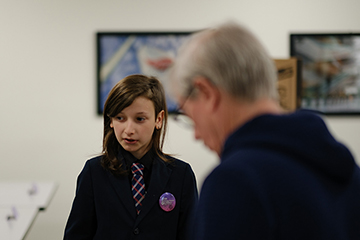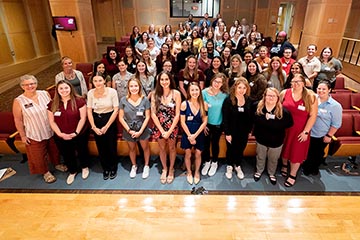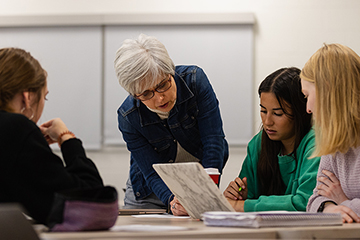Bringing balance to teens’ social media
CMU partnership with Upper Peninsula schools focuses on healthy habits
For young teens struggling with social isolation in pandemic times, a smartphone can be a lifeline. But too much Instagram, Snapchat, TikTok and the like can be unhealthy.
That's where Central Michigan University psychology faculty member Sarah Domoff comes in.
Backed by a grant from the Detroit-based Children's Foundation, Domoff will teach middle school teachers and students in Michigan's rural Upper Peninsula to avoid cyberbullying, dangerous content, sleeplessness and other problems linked to social media overuse.
"Teens need to learn to navigate their digital worlds in healthy ways," Domoff said.
She and her team of student research assistants in CMU's Family Health Lab are partnering with the Delta Schoolcraft Intermediate School District to train two teachers this summer and follow up with weekly phone calls through the school year. Those first two trainees will introduce the program to other teachers and counselors.
Domoff will assess results with an eye toward expanding the program.
"If we find this is effective, we absolutely would love to bring it to more schools around the state," she said.
Help for students and educators
The program will reach about 300 sixth and eighth-grade students in the Gladstone and Escanaba school districts starting this fall.
Six health class lessons will cover topics such as how social media content affects teens, how to critically assess information, how to be mindful about sharing and privacy, and how to avoid cyberbullying and support victims.
These issues affect not only teens but also educators who set policies for use of digital devices at school and deal with the fallout from their use and misuse. Domoff will follow up with both groups to measure the program's effectiveness.
"This is really the first foray into evaluating: 'Does this work? Does it improve outcomes for teachers and administrators?'" Domoff said. "But also, we want to know: 'Does this work to improve healthy digital media use with youth?'"
Staying healthy and social
Domoff advises teens to use social media in healthy ways to prevent burnout and overload, especially in the COVID-19 era.
- Understand what you're reading before you share, post or tweet it. Is the content from a trustworthy site? Think critically and ask yourself: Is it backed by scientific evidence? Does it feel like click bait? Is it trying to make someone or a group look bad?
- Even with school being out, a healthy sleep schedule is still extremely important for your health. Try turning off your electronics an hour before going to bed.
- Include downtime in your technology routine. Being inside your home all day is a drastic change for most people, so remember to go outside or disconnect from technology whenever you can — as long as you're doing so safely.
- Social media is a great tool for staying connected while social distancing. Try playing online with friends, Facetiming with family, or sending fun TikTok videos.
Domoff provides a list of online resources for families coping with the pandemic. Commonsensemedia.org offers additional resources for social media use.
Creating a ripple effect
Kristine Paulsen, educational consultant with Delta Schoolcraft ISD, said the work of Domoff and her team popped up right away when she began searching for ways to help the district address issues with digital devices.
"Technology has so many benefits, but at the same time it presents so many challenges to make sure you're using it in healthy, productive ways," she said.
Paulsen emailed Domoff, and the partnership grew from there.
"To be able to access and learn from their research I think is going to be huge," she said. "This provides an opportunity to really learn strategies that will benefit not only our students but have the potential to benefit students throughout the state and around the country.
"There's going to be a ripple effect."




